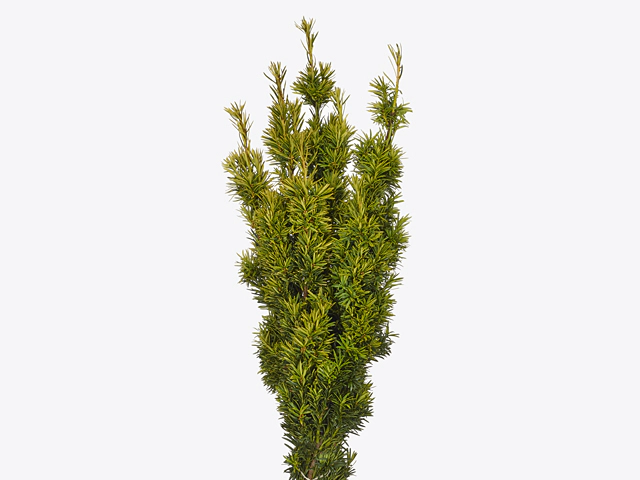Taxus baccata 'Fastigiata Aurea' per bunch

| Life span | Long (over 200 years) |
| Leaf tip | Pointed/acute |
| Winter hardness | Good (USDA-zone 5, 6) |
| Leaf, general shape | Needle-shaped |
| Leaf size | 2 - 3 cm |
| soil pH requirement | Slightly acidic (pH 4,5 - 6,5); Alkaline (pH > 7,5); Acid (pH < 4,5); Neutral (pH 6,5 - 7,5) |
| Light conditions | Semi-shades; Shady; Sunny |
| Leaf, main color | Dark green |
| Leaf colour, pattern | Marginate |
| Toxicity (if consumed) | Highly toxic |
| Moisture requirements | Wet; Dry; Normal |
The Taxus baccata 'Fastigiata Aurea', also known as the Golden Irish Yew, is a remarkable evergreen tree that adds a touch of elegance to any garden or landscape. This particular variety of yew is highly sought after for its unique characteristics and versatility.
With a life span of over 200 years, the Taxus baccata 'Fastigiata Aurea' is a long-lasting plant that can provide beauty and enjoyment for generations to come. Its pointed and acute leaf tips give it a distinctive appearance that sets it apart from other yew trees.
One of the standout features of this yew tree is its winter hardiness. It can thrive in USDA zones 5 and 6, making it suitable for a wide range of climates. This adaptability ensures that the Golden Irish Yew can withstand harsh winter conditions without losing its vigor and attractive foliage.
Speaking of foliage, the Taxus baccata 'Fastigiata Aurea' boasts needle-shaped leaves that are 2 to 3 centimeters in size. The main color of the leaves is a lush, dark green, which creates a stunning contrast against any backdrop. The marginate leaf pattern further adds to the tree's visual appeal, giving it a touch of elegance and sophistication.
While this yew tree is undoubtedly beautiful, it is essential to note that it has a highly toxic nature if consumed. Therefore, it is crucial to exercise caution, especially if there are children or pets around. However, as long as proper care is taken, this toxicity should not pose a significant concern for homeowners.
When it comes to soil conditions, the Taxus baccata 'Fastigiata Aurea' can adapt to a variety of pH levels. It prefers soil that is slightly acidic, with a pH range of 4.5 to 6.5. However, it can also tolerate alkaline soil with a pH greater than 7.5, as well as acidic soil with a pH less than 4.5. Additionally, it can thrive in neutral soil with a pH range of 6.5 to 7.5. This versatility makes it easier for gardeners to incorporate this stunning tree into their existing landscapes.
In terms of light conditions, the Golden Irish Yew can adapt to a range of environments. It can thrive in semi-shady areas, as well as areas with partial or full sun exposure. This adaptability makes it a versatile choice for gardens with varying light levels.
Lastly, the Taxus baccata 'Fastigiata Aurea' has relatively moderate moisture requirements. It can tolerate both wet and dry conditions, making it suitable for a variety of landscapes. However, maintaining normal moisture levels is recommended to promote optimal growth and health.
In conclusion, the Taxus baccata 'Fastigiata Aurea' is a magnificent tree with a long lifespan, stunning dark green foliage, and unique characteristics. Its adaptability to various soil and light conditions, along with its moderate moisture requirements, make it an excellent addition to any garden or landscape. However, it's important to note its high toxicity when consumed and take necessary precautions to ensure the safety of all.
Market availability index by month:
| Jan. | Feb. | Mar. | Apr. | May | Jun. | Jul. | Aug. | Sep. | Oct. | Nov. | Dec. |
|---|---|---|---|---|---|---|---|---|---|---|---|
| 4 | 4 | 3 | 3 | 4 | 3 | 3 | 3 | 3 | 3 | 3 | 3 |